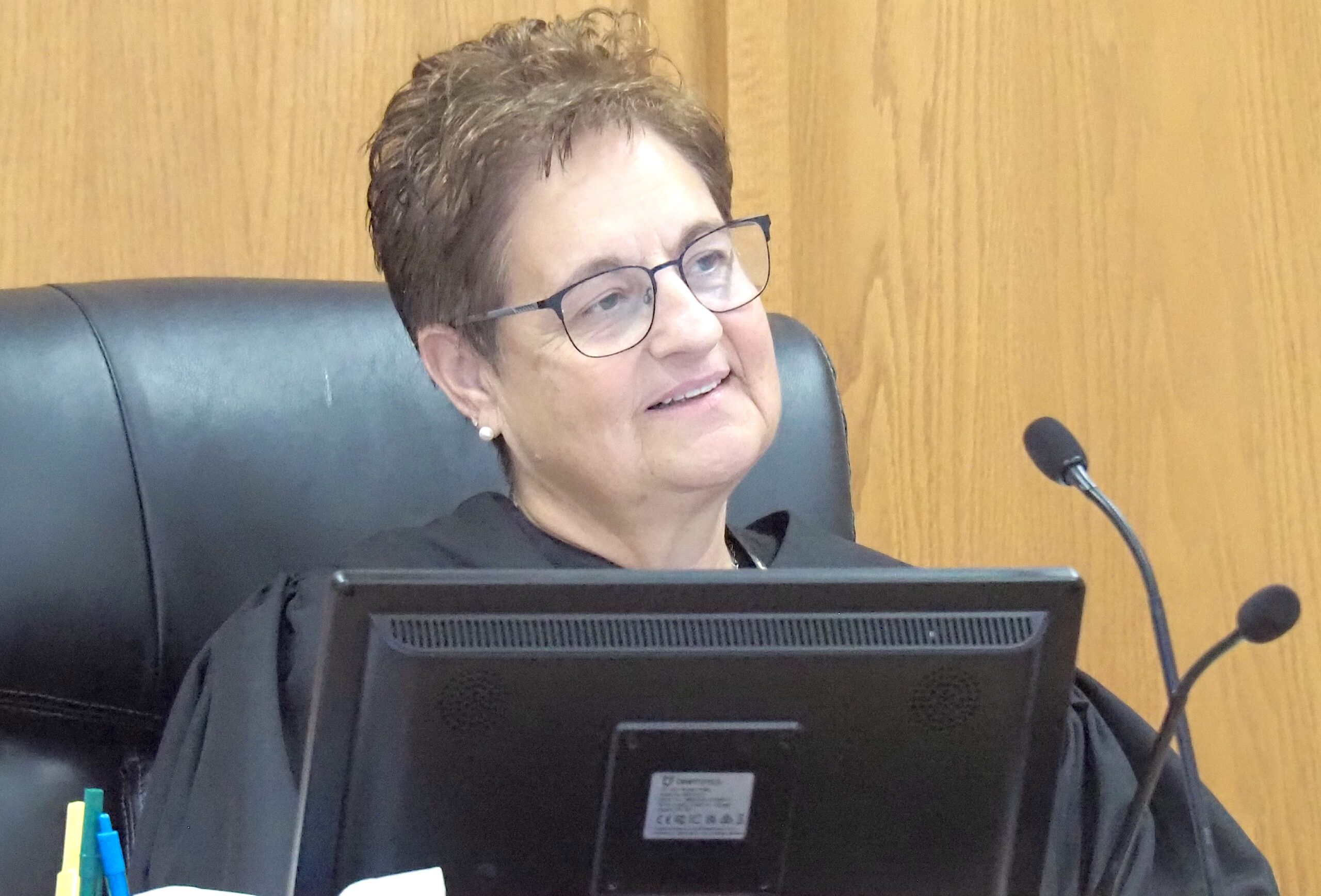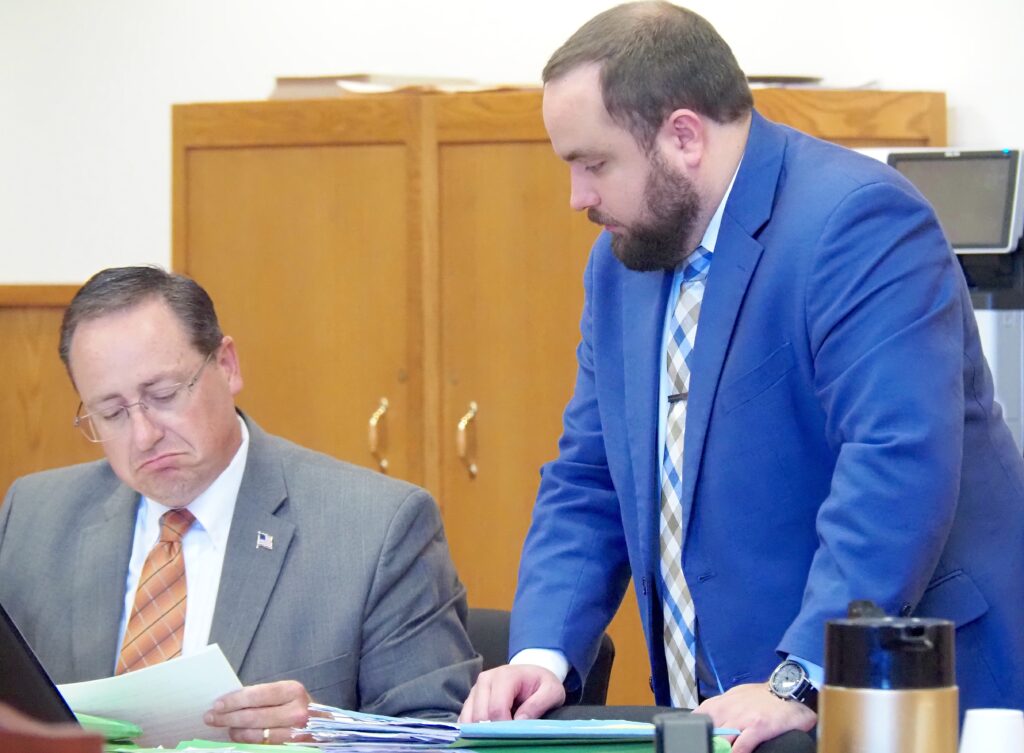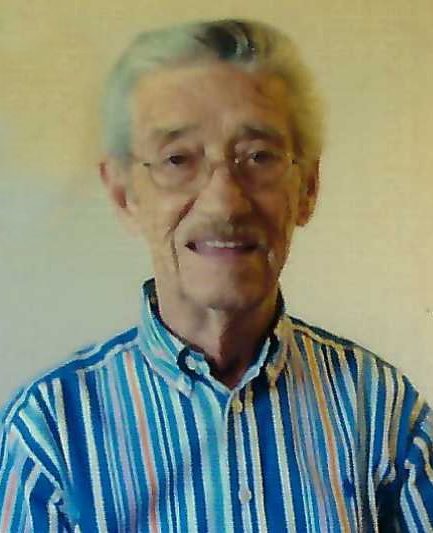‘We have to agree to disagree’: Henze stands by ruling that Eyler’s substitution of judge motions weren’t timely filed

QUINCY — Circuit Judge Holly Henze maintained Thursday afternoon her decision to strike First Assistant State’s Attorney Todd Eyler’s motions for a substitution of judge in two high-profile cases in Adams County Circuit Court, asserting the motions were not timely filed.
Eyler filed his motion to replace Henze on Thursday, Oct. 3, after Matthew Steinkamp, facing two Class X drug felonies, was given pretrial release at an Oct. 2 status hearing. Steinkamp must wear a GPS monitor and remain confined at his parents’ home in Quincy.
Eyler also filed a motion for substitution of judge in the Tynell Washington case.
Washington is one of four men arrested in connection to a Nov. 5, 2023, burglary along North Bottom Road.
Public Defender Kevin Bross, who represents Washington and Steinkamp, filed a motion on Oct. 8 to strike Eyler’s motion. He argued that Washington’s case isn’t set on a trial docket for Henze, making Eyler’s motion “premature and improperly filed for untimeliness.” Henze ruled on the same day of Bross’ motion, agreeing Eyler’s motion was not filed in a timely fashion.
Eyler filed another motion on Oct. 15, asking Henze to reconsider her order because she “had not acted consistently in (three) other cases.” He provided motions filed in Adams County Circuit Court by Public Defender Betsy Bier asking in June for substituting Henze as the judge on behalf of Joshua Shaffer, Michael Wright and Nathaniel Parker. Each case was eventually given in July to Circuit Judge Tad Brenner.
Eyler began his argument Thursday saying the right to a trial before a fair and impartial judge has been declared by the Illinois Supreme Court as “fundamental” to a case.
“If somebody attempts to make a distinction between (the Steinkamp and Washington) cases and the three other cases that were referred to when the motion was filed, and the suggestion is, ‘Well, nobody objected to those cases,’ (state) statute doesn’t include that,” he said. “The statute doesn’t say there’s a triggering effect required for somebody to reject.”
“The distinction to be drawn with those cases is they were timely filed,” Henze said. “All of those cases were filed within 10 days, allowed by statute to file a motion for change of judge. The cases before the court today were not timely filed.”
“You’re saying that the second a case is assigned to your docket, it is set for trial,” Eyler argued. “(Steinkamp’s and Washington’s) cases are not currently set for trial, and the statute talks about cases being set on a court’s trial docket. If that is the position being taken, then I think we need to be clear.”
Eyler said he believed once a case is set for trial, a 10-day clock starts during which a substitution of judge motion can be made. He cited case law in Illinois, saying simply putting a case on a docket overseen by a judge is not the act of setting the case for trial.
“If you’re saying (the day a case is put on a docket overseen by a judge) is the day that starts the clock ticking, then we have a totally different issue,” Eyler said. “Simply being on (a judge’s) cattle call status-type docket doesn’t start that clock. Maybe you told me, and I misinterpreted what you said.”
Henze said the Washington and Steinkamp cases fall into what she called “no man’s land.”
“If we say the trial statute says trial call, and that is the cattle call docket, (Eyler’s motions) weren’t timely filed,” she said. “If we say trial call is when it’s set on a docket before me, then they’re not timely filed.”
She suggested that Eyler could file a motion at any time to substitute a judge for cause, supporting it with an affidavit. Another judge would determine if actual bias or prejudice exists.
Eyler disagreed, saying the three cases of Bier’s were in the same “holding pattern” as his cases because they had not been set to trial before Henze.
“Miss Bier filed those for whatever reason,” he said. “I know from speaking with her that it’s because her clients had bad experiences in front of you. They didn’t want you. That’s their right, pursuant to statute. Those cases were not set for trial to trigger the 10-day (clock).”
“Under the criminal statute, it talks about an automatic change,” Henze said. “It’s automatic if it’s timely filed.”
Eyler said he filed the motion to state he was not alleging specific prejudice that would require an affidavit.
“So if that’s your ruling, then we have to agree to disagree,” he said. “Reasonable people can disagree.”

Bross reminded Henze of the case of Bradley Yohn, who as a pro se lawyer attempted to file a motion for substitution of judge by cause. Yohn’s motion was deemed legally deficient and stricken by Associate Judge John Wooleyhan the day after it was filed.
“My position is (Eyler’s motion is) legally deficient. Therefore it should be stricken,” Bross said. “The court has an obligation to apply the law in this case as it did, strike the state’s motion as it did, and allow these cases to proceed forward. If someday these matters are set before a trial judge on a trial docket, and the state files a motion for substitution of judge within 10 days, maybe we can be back here arguing whether or not it was too late, (but Eyler’s recent motions) should have been filed in June 2024. … We are in the middle of sort of nowhere with no real buoy that gives us 10 days from anything when the state filed this motion.”
Eyler called the reference to Yohn as a “red herring.”
“We all know, the public knows, anybody who is alive knows Bradley Yohn was a character, and the amount of chaos he reaped on this criminal justice system is certainly a red herring,” he said.
Eyler then admitted Henze’s ruling still confused him.
“If what is considered by the statute to be the trial call that would start that clock for automatic substitution, or if we determine that trial call is actually being placed on a trial docket pursuant to our schedules, that clock hasn’t started yet,” she explained. “What I’m saying is I don’t know how it is to be determined, but either way, your motions weren’t timely filed under whichever theory you want to pose.”
“You clarified it, so that’s fine,” Eyler said.
“Give (former Adams County State’s Attorney) Jon Barnard credit,” Henze said. “He used to always say we could disagree about being disagreeable. Certainly this might be an issue for the appellate court to sort out for us. I think we do disagree.
“Another thing that Mr. Bross brought up in your motion to reconsider paragraph three, (in which Eyler wrote that Henze’s ruling) was ‘one of the most efficient and expeditious judicial acts ever seen.’ A court can summarily dismiss a motion without having the hearing, which I did. I actually was able to take that verbiage as a compliment. Those attributes have served me well throughout my career, so I appreciate that recognition.”
Miss Clipping Out Stories to Save for Later?
Click the Purchase Story button below to order a print of this story. We will print it for you on matte photo paper to keep forever.

